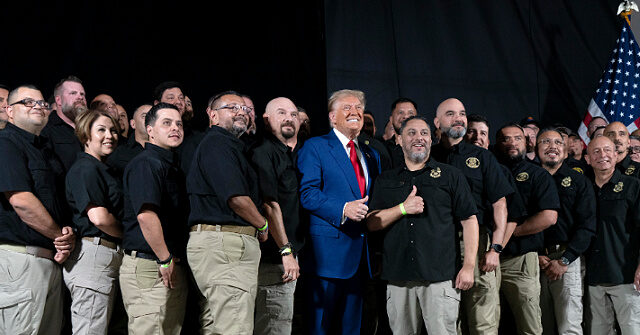During a recent rally in Arizona, the National Border Patrol Council (NBPC) expressed unwavering support for former President Donald Trump, making a stark contrast with current leadership. Union president Paul Perez delivered a passionate speech, directly criticizing Vice President Kamala Harris’s effectiveness as the so-called “border czar.” Perez emphasized that Trump’s commitment to border security and support for border patrol agents legitimizes the council’s endorsement. According to him, Harris’s policies have resulted in increased violence and crime, arguing that the unvetted individuals entering the U.S. under her tenure pose serious risks to communities across the nation. He warned that if the current administration’s policies persist, American cities would be significantly impacted by crime and disorder.
In his remarks, Perez highlighted what he sees as a critical decision for voters: to either perpetuate the chaos at the border, which he attributes to the Democratic agenda, or to support Trump in reinstating effective border policies. He framed the upcoming election as not just a political contest but a matter of national security, strongly asserting that Trump has demonstrated unwavering dedication to border law enforcement and has actively fought for the agents tasked with securing the borders. Perez claimed that the only viable solution to the problems facing the U.S. southern border is a return to Trump’s leadership, emphasizing the urgent need for change to protect communities from crime and the influence of cartels.
The NBPC’s endorsement of Trump is significant for several reasons, particularly since the council has historically refrained from endorsing candidates in presidential primaries. This deviation from their usual stance illustrates the gravity of the border security issue, as perceived by patrol agents. In earlier elections, the NBPC maintained a neutral position; however, their decision to break from tradition signifies a strong conviction that the current situation demands a proactive approach. Additionally, the union represents 16,000 agents, indicating that a considerable portion of the Border Patrol community supports Trump’s policies and vision for immigration and law enforcement.
The reaction from the NBPC underscores their dissatisfaction with the current administration’s approach to border security and immigration. Perez’s statements reflect concerns that the Biden-Harris administration’s policies are enabling crime, undermining the safety of citizens, and allowing gangs and cartels to gain control. This viewpoint aligns with a growing narrative among certain law enforcement communities that argue for stricter immigration controls and enhancements for security protocols. The NBPC’s perspective may resonate with many voters who share fears about the implications of current policies, especially those living in border states or areas significantly affected by drug-related violence.
Breaking with its prior practice of political neutrality, the NBPC utilized their platform to advocate for what they perceive as the best interests of border security and public safety. They articulated this shift by stating that they cannot remain silent when the lives and security of American citizens are at stake. Their endorsement of Trump illustrates a belief among union members that the former president’s administration better aligned with their vision for securing the U.S.-Mexico border. This message echoes through law enforcement circles, where many professionals advocate for robust measures in response to rising crime rates associated with illegal immigration and drug trafficking.
As the election approaches, the ramifications of the NBPC’s endorsement could influence voter sentiment, particularly among those concerned about border security. The council’s commitment to Trump suggests a desperation among some border agents to see a return to hardline immigration policies and increased funding for border resources. By vocally supporting Trump, the NBPC aims to galvanize support among the electorate for a candidate they believe will prioritize the needs of law enforcement and the safety of American communities, shaping the narrative around border security as a divisive but critically important issue in the forthcoming election.

